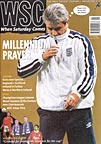 The 'Battle of Britain' had all the papers talking, but as Archie MacGregor discovers, the tabloids can take things a little to far
The 'Battle of Britain' had all the papers talking, but as Archie MacGregor discovers, the tabloids can take things a little to far
So that was the Battle of Britain. To paraphrase an apposite remark, surely never in the history of Scottish journalism has so much hype and mindless posturing been so relentlessly sustained by so few. In Scotland, the sight of the national team once again performing its party piece of glorious failure has been greeted with something approaching fatalistic acceptance. Yet mixed in with the anguish, ennui and glee (at the Wembley result) there is also a tangible sense of relief that the goddam war is over. All that remains in the run-up to the season of goodwill is a deep-seated wish that the tabloids abide by the terms of the ceasefire. Some hope.
The advent of devolution may signify Scotland’s coming of age as a modern nation state, but while the rest of us have been growing up, some of our tabloid newspapers have apparently opted to stay in the kindergarten. From that fateful moment on October 13 in Aachen when “international football’s oldest rivals” were paired together in the Euro 2000 play-off draw, the Scottish Sun and Daily Record in particular set about working through the A to Z of tabloid-induced hysteria with ferocious zeal. The symbolic existence of the Scottish parliament as a catalyst for an ongoing reappraisal of the relationship with our southern neighbour? Forget it.
By the following morning it was the familiar Neanderthal fare of the screaming headlines with stories continued inside on pages 2, 3, 4, 5… On its front page the Record concocted its now infamous “Boastbusters” theme, a spoof on the Ghostbusters logo featuring Kevin Keegan with a saltire plastered over his mouth, and considerately instructed its readers to “help Scotland shut Keegan up with our cut-out-and-keep poster”.
Uncannily, the Sun featured, yes, a close-up photo of Keegan with a saltire over his mouth. What a pity for them that, whatever his other shortcomings, Keegan was a model of diplomacy in his public relations and assiduously avoided raising Scottish hackles with presumptuous pronouncements on the likely outcome.
On the inside pages we had reheated tales of English bias in the London-based media, English thuggery on the terraces and mock outrage that Tony Blair had had the temerity to pronounce his support for England. Typical of the Record’s skewed perspective was its feature on players with unusual surnames who have been selected for England, including the unfortunate SR Bastard in 1880. The piece was given an unnecessarily acerbic twist by an over the top headline, Here’s The First English B****** and an attempt to suggest modern day equivalents – step forward Bobby Robson, Sir Alf Ramsey and Alan Shearer for their alleged hatred of the Scots.
In subsequent days an increasingly defensive Record was to protest its innocence against charges of incitement by pointing out that its editorial on October 14 had asked its readers to Be Nice, Even To English (sic). Cynicism was the only appropriate response to the Sun’s attempts to play the Tartan card – especially when you know only too well that the English editions will be full of Jock-baiting trash.
Yet again football has been a casualty of the circulation wars. The Scottish tabloids are a dab hand at it – at least four times a season they get the opportunity to inflate a Celtic v Rangers match into the most important meeting in the history of the Old Firm. Then they wring their hands when it descends into the sort of disgraceful mayhem that enveloped the title decider at Celtic Park last May. What made the tone of the Record’s coverage both bemusing and reprehensible was that the paper’s political stance is pro-New Labour and virulently anti-SNP, while its editor Martin Clarke is English and has a CV which includes a spell at the helm of the stridently right-wing Scottish Daily Mail.
Scottish-based English folk will have been consoled to discover, however, that there are others in the Record’s cannon fodder caste system for whom it reserves even greater disdain – these being the SFA, BSkyB, the English FA, Glasgow council workers and, when the wheels came off on the field, Craig Brown.
The broadsheets mercifully provided an antidote to the rabble-rousing. The Sunday Herald’s editorial on October 17 contained a barely concealed dig at the Record’s antics: “It is only a game and those 90-minute patriots are not doing us any favours by invoking the sort of naked nationalism which has nothing to do with love of country but much to do with instigating hatred of our neighbours.”
There was healthy coverage given to the thoughts of England supporters living amid the tabloid siege while, in keeping with a trend that emerged during France 98, there were even a few writers brave enough to question the “support anybody that’s playing England” knee-jerk.
So was it the red-tops or the broadsheets that provided the most accurate barometer of Scottish opinion? The level of opprobrium directed towards the Record for its opening salvos lends encouragement to the belief that it was the latter. For the more cynical, however, there was also the realisation that, despite all the emphasis on separate identities and distinctness of culture, Scotland and England really do have rather a lot in common – mediocre national teams, inept football authorities and a tabloid press that is an embarrassment to us all.
From WSC 155 January 2000. What was happening this month